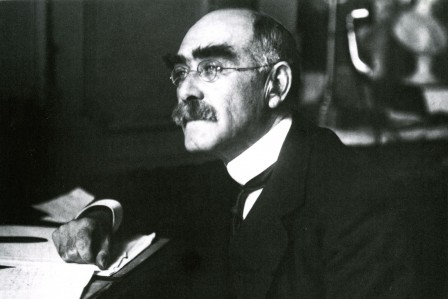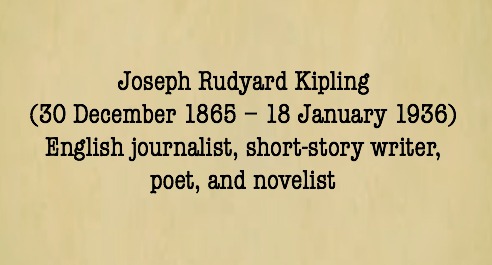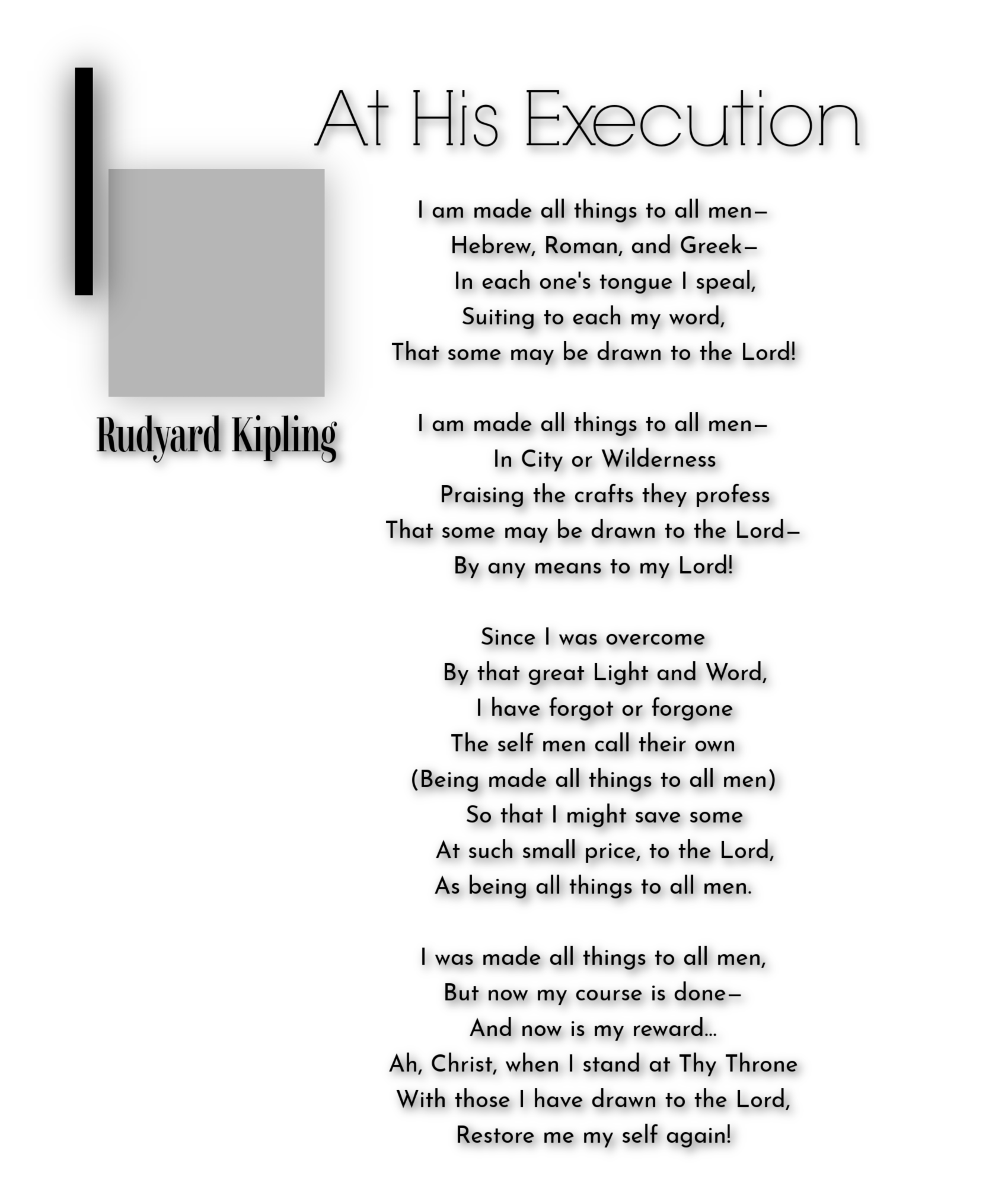
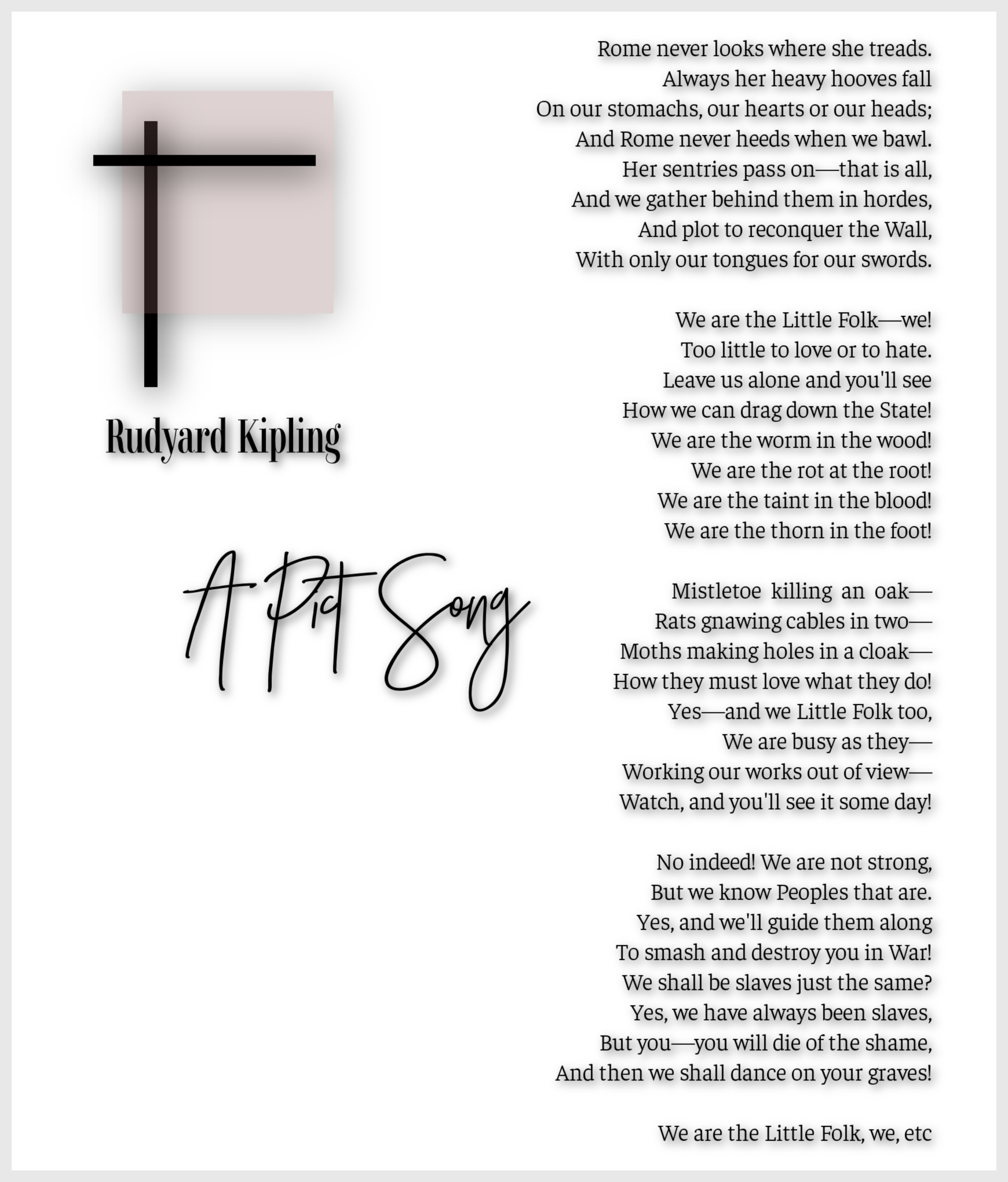
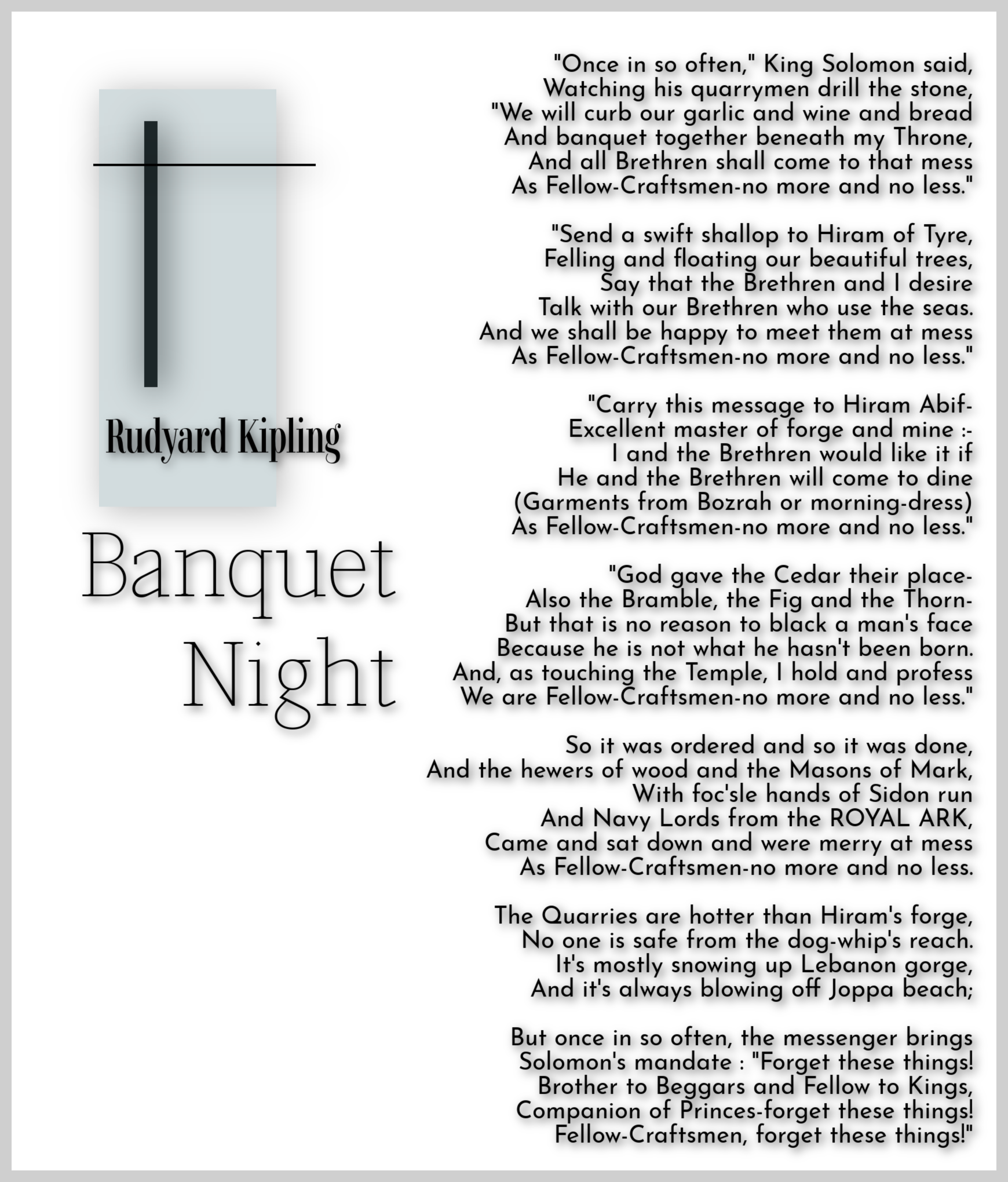
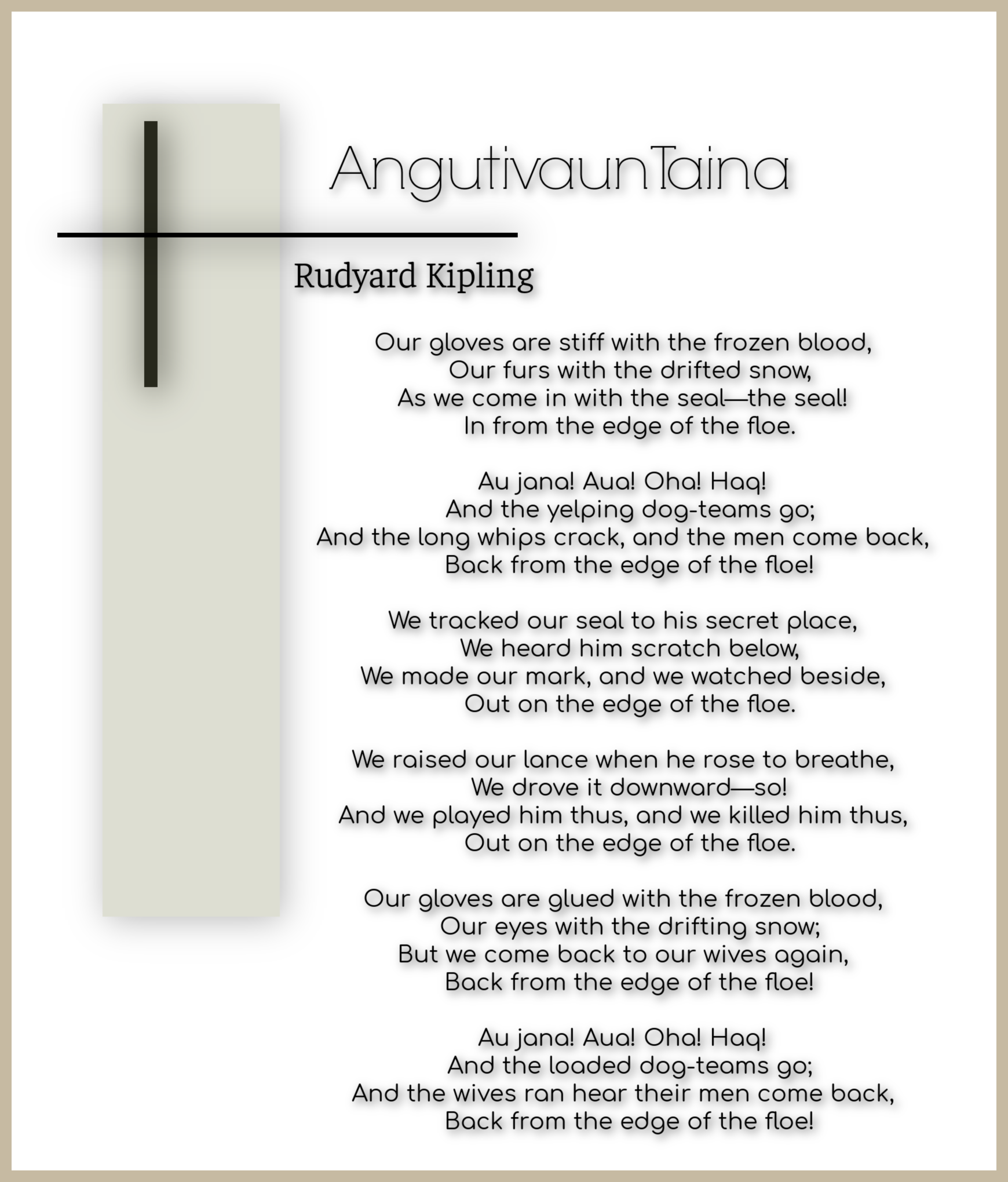
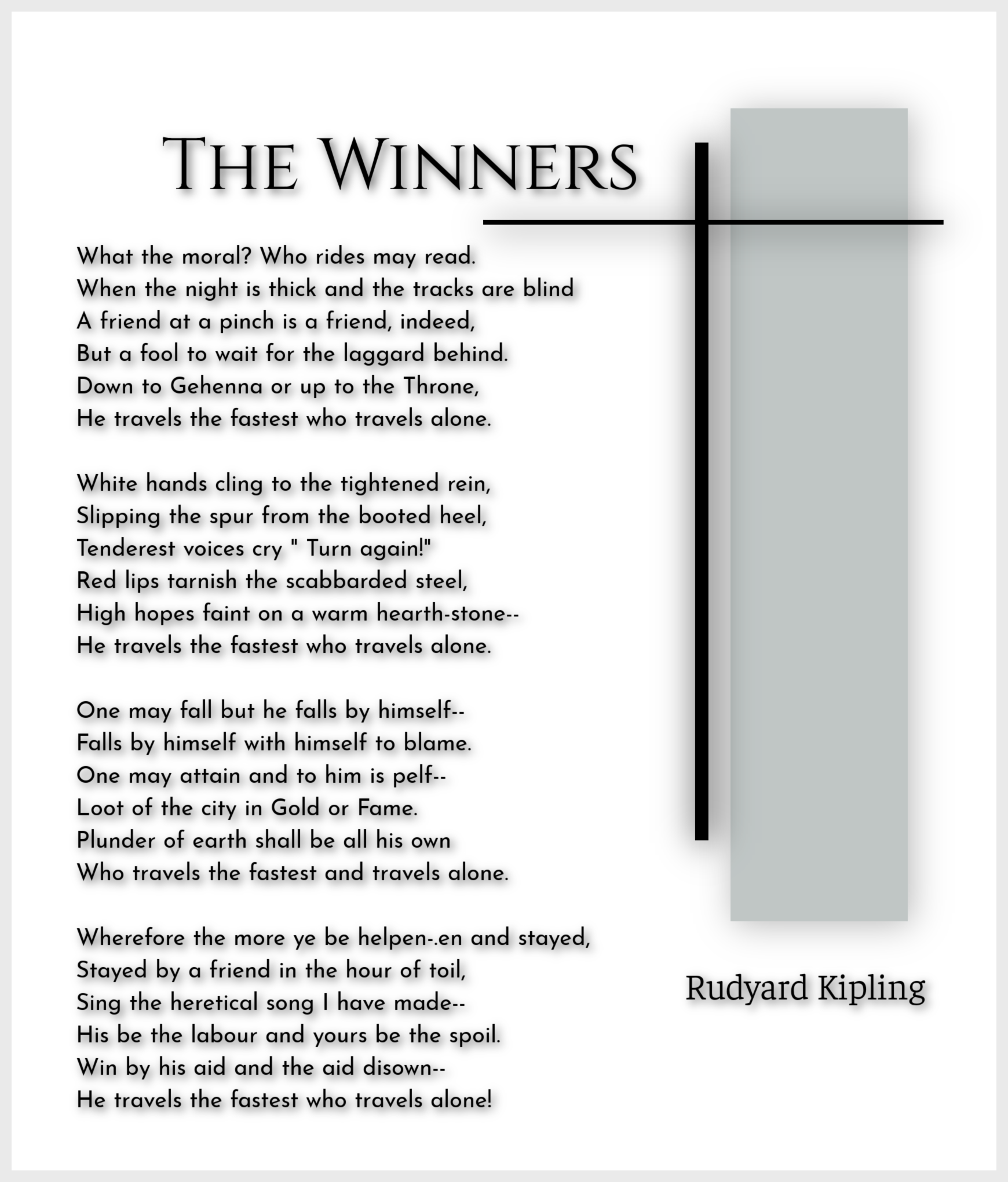
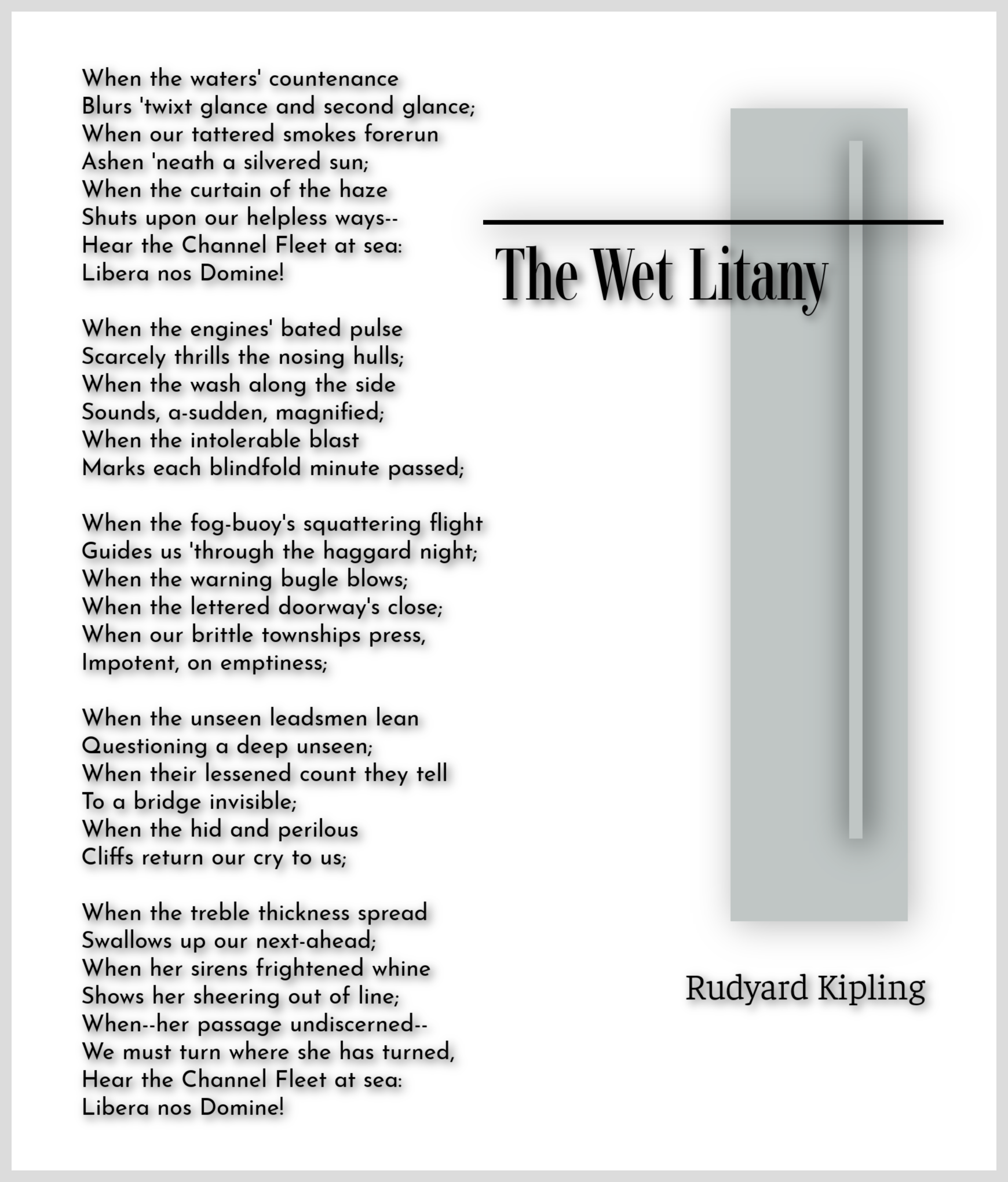
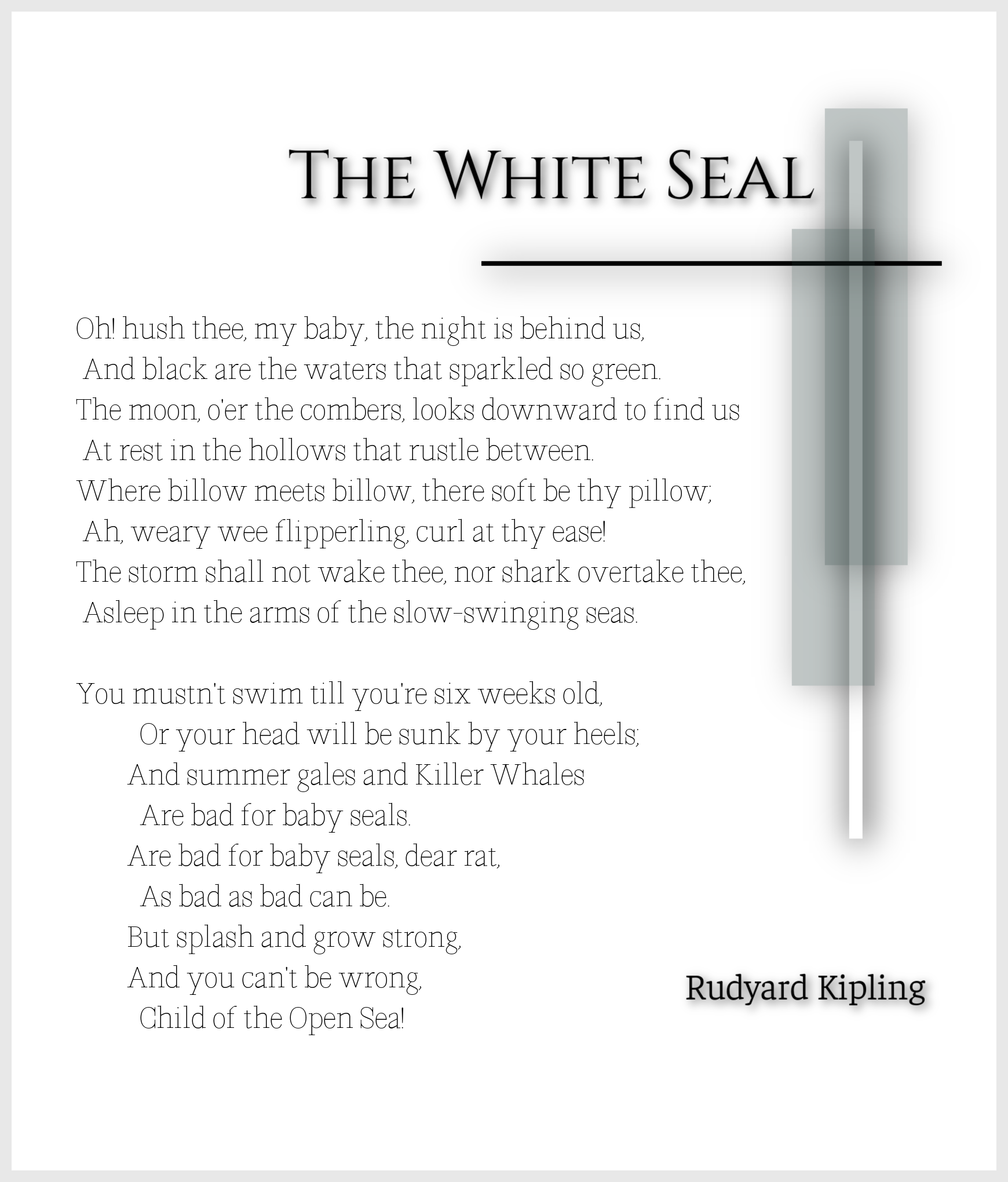
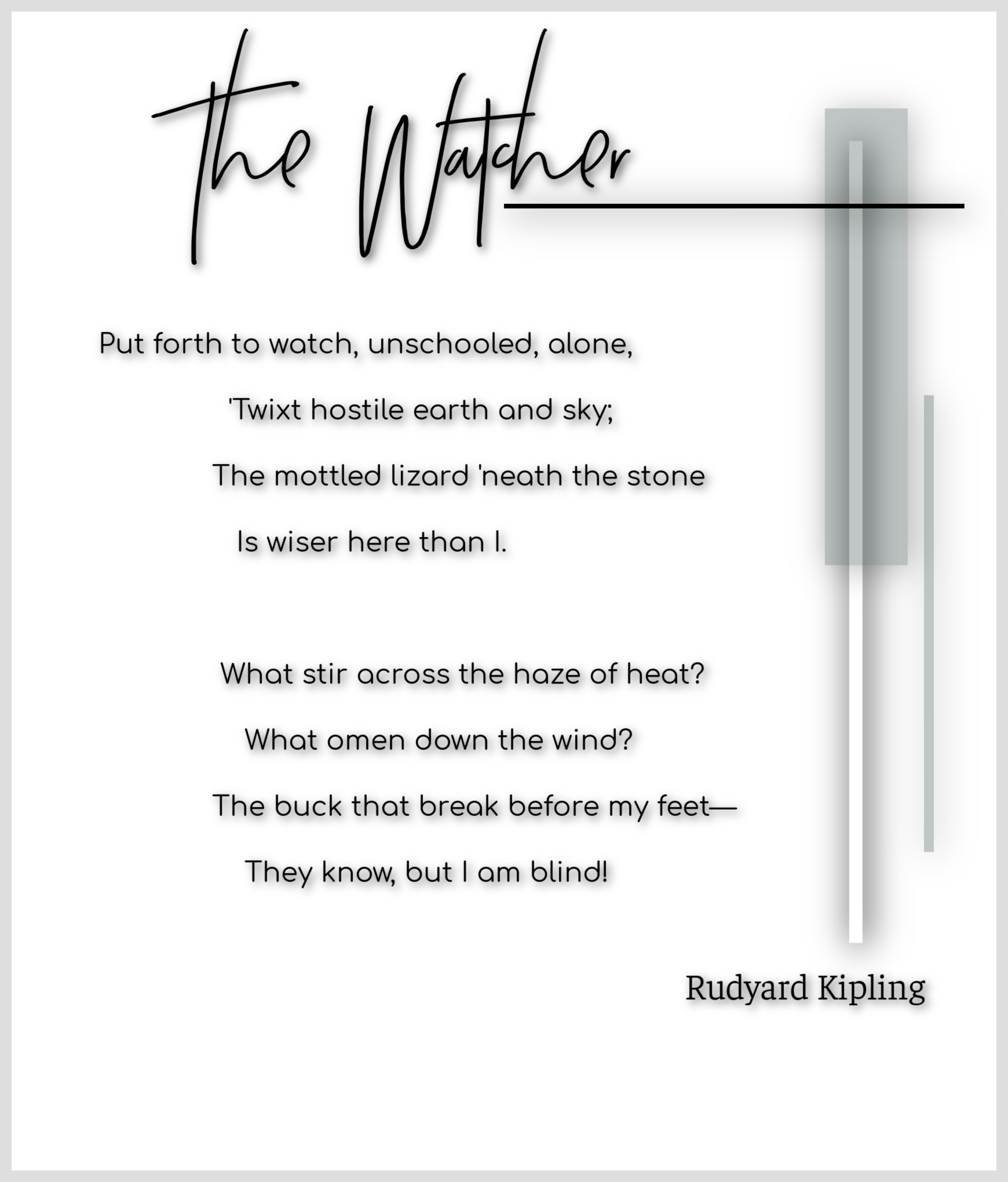
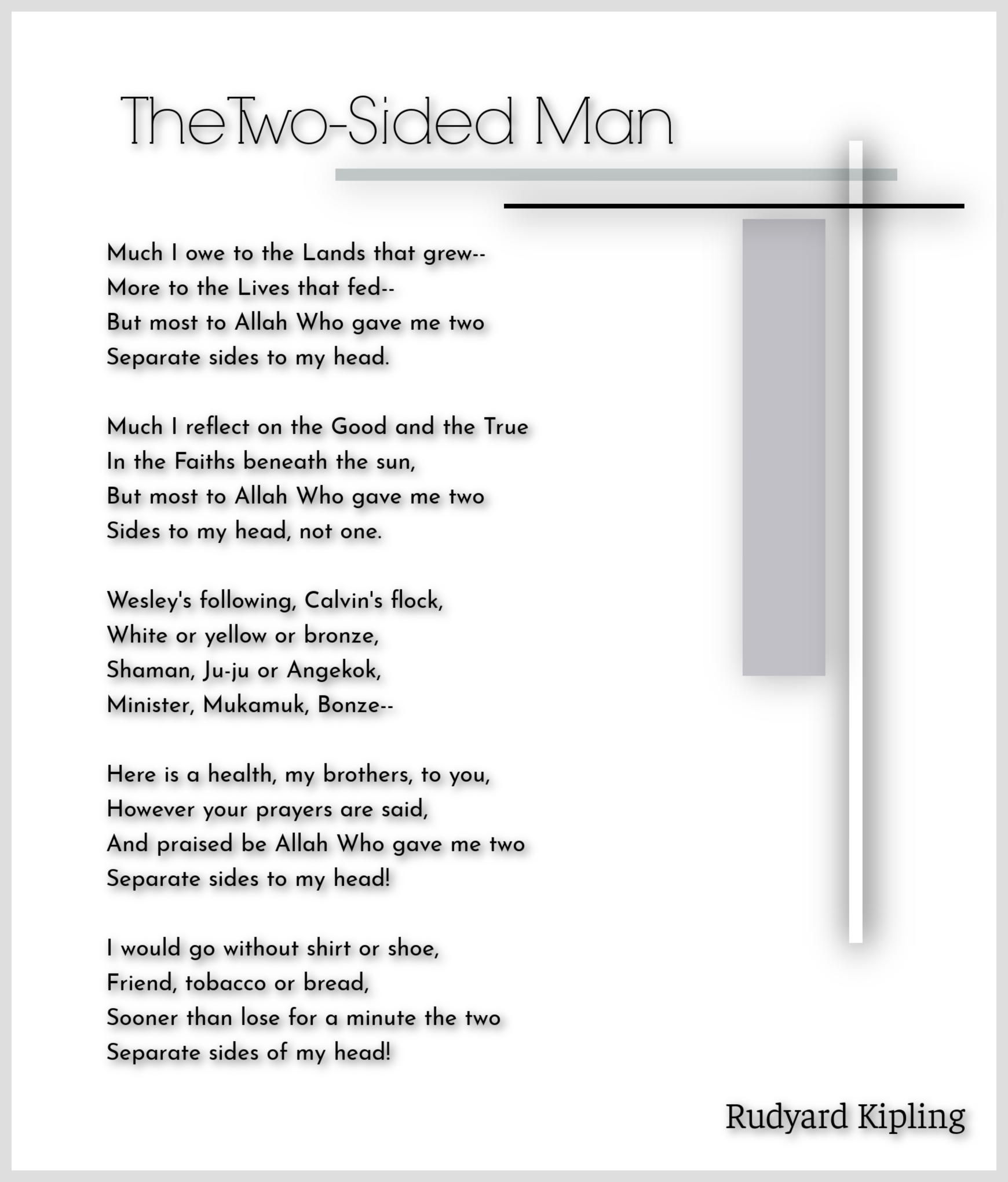
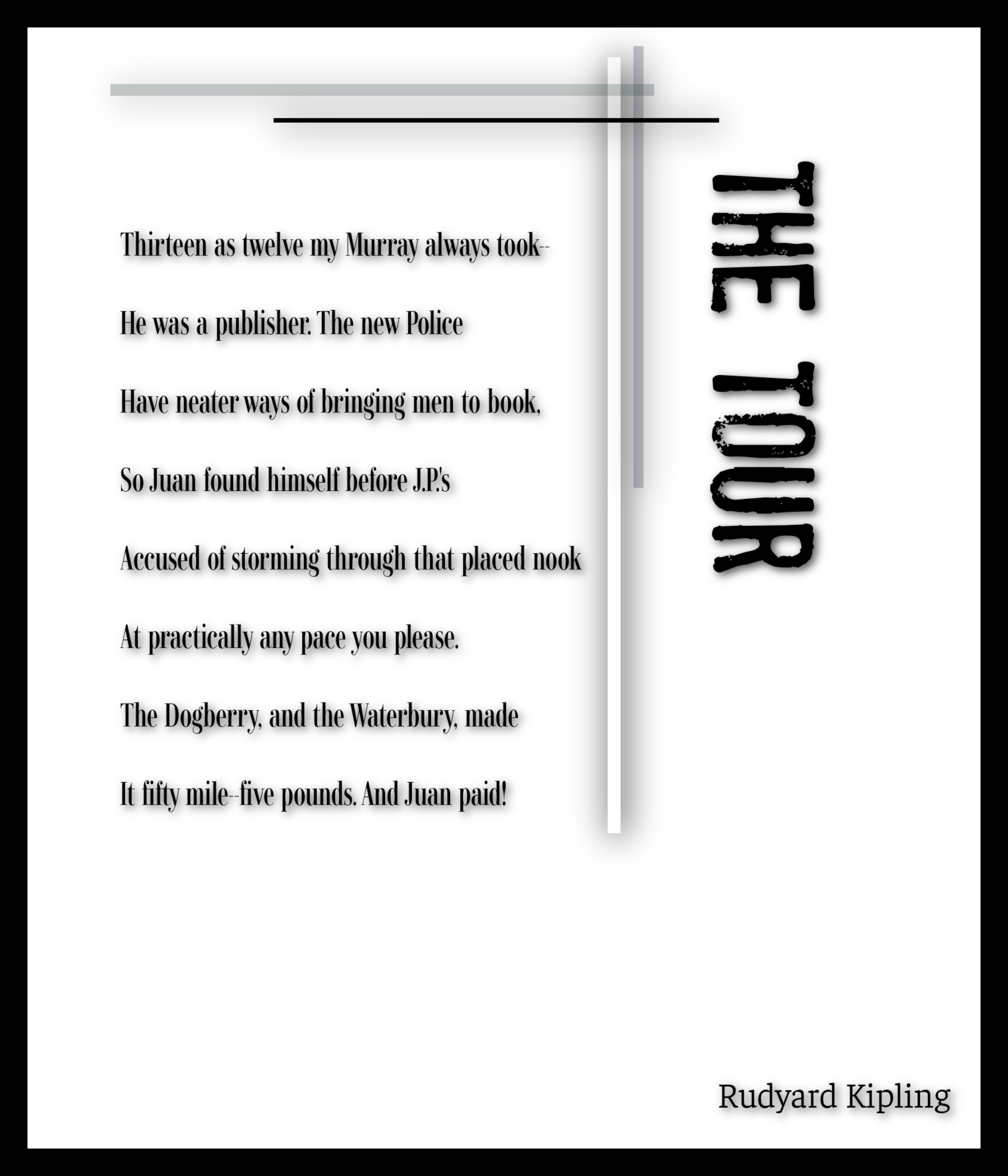
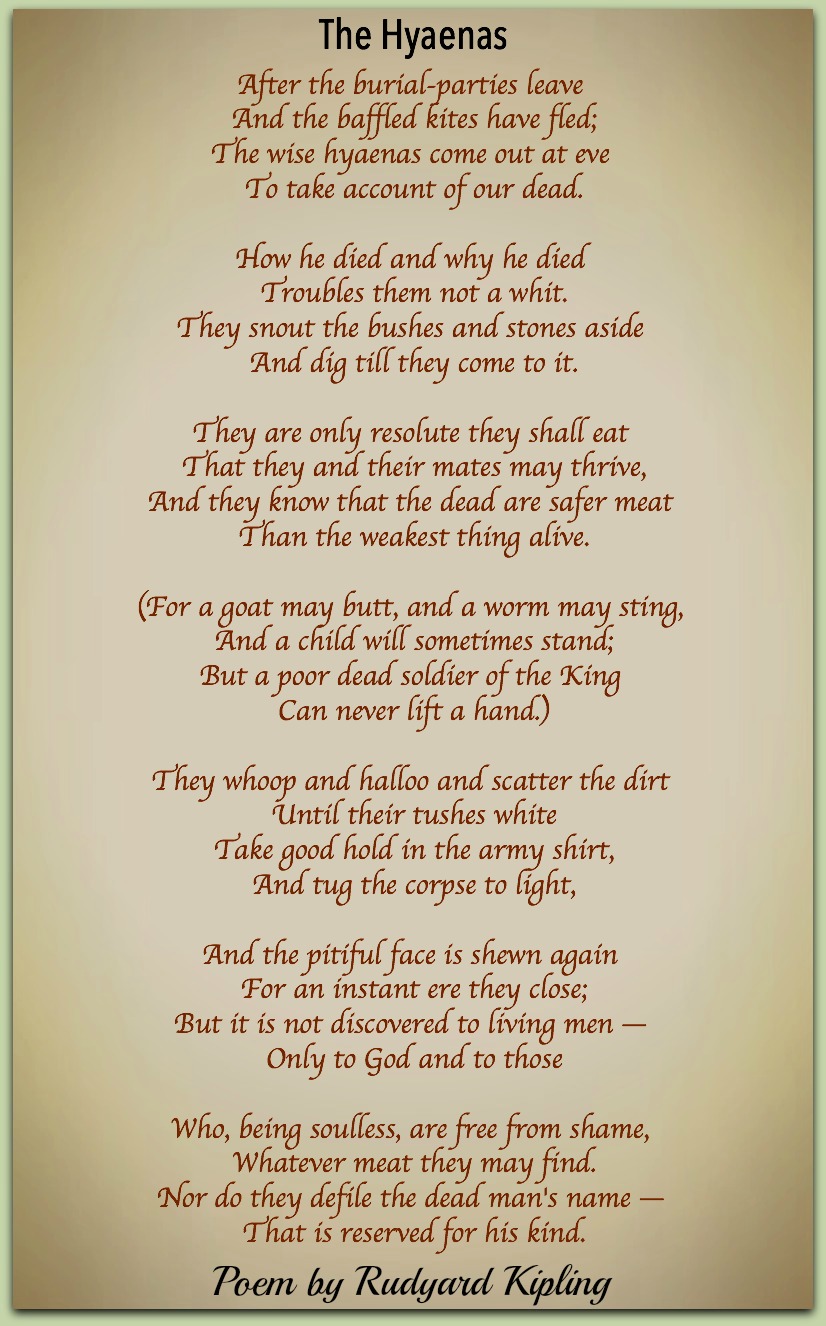
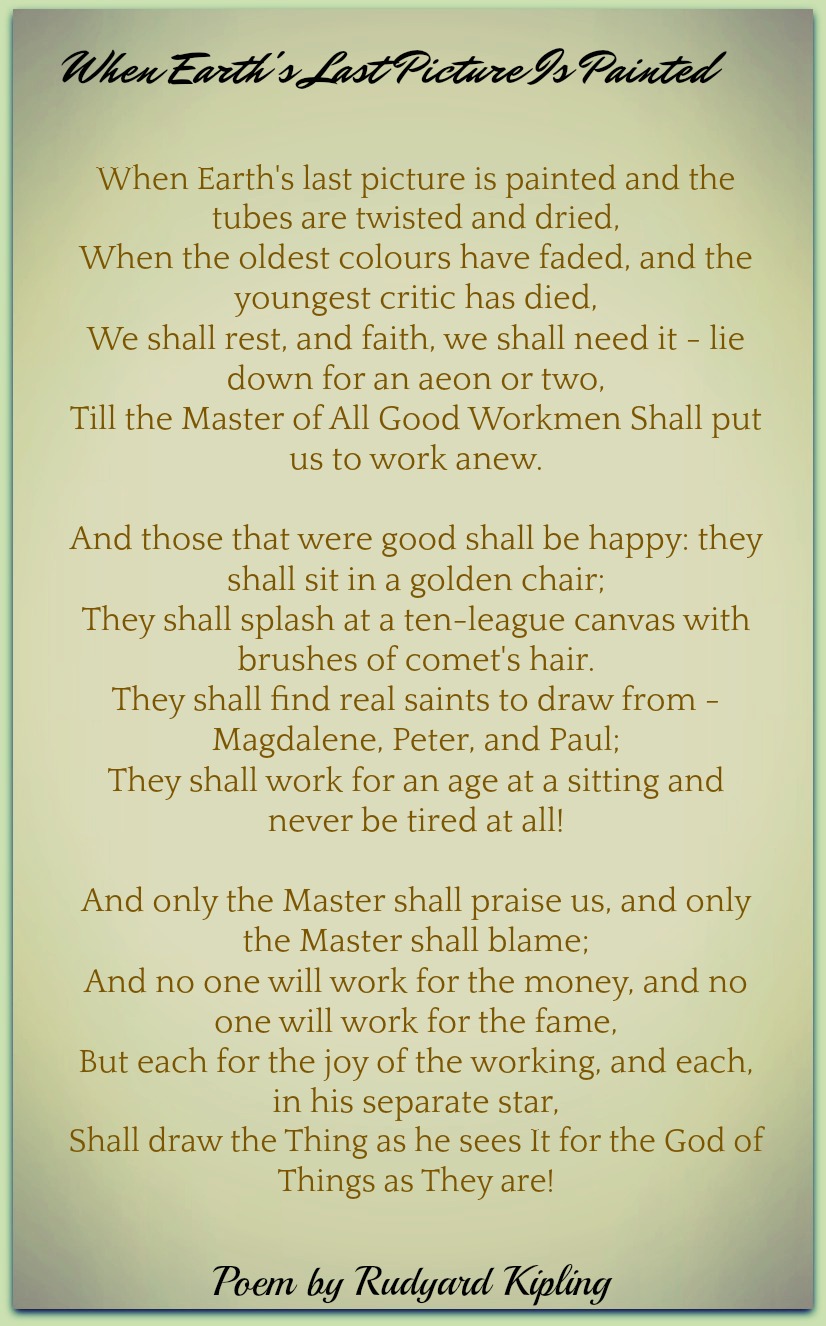
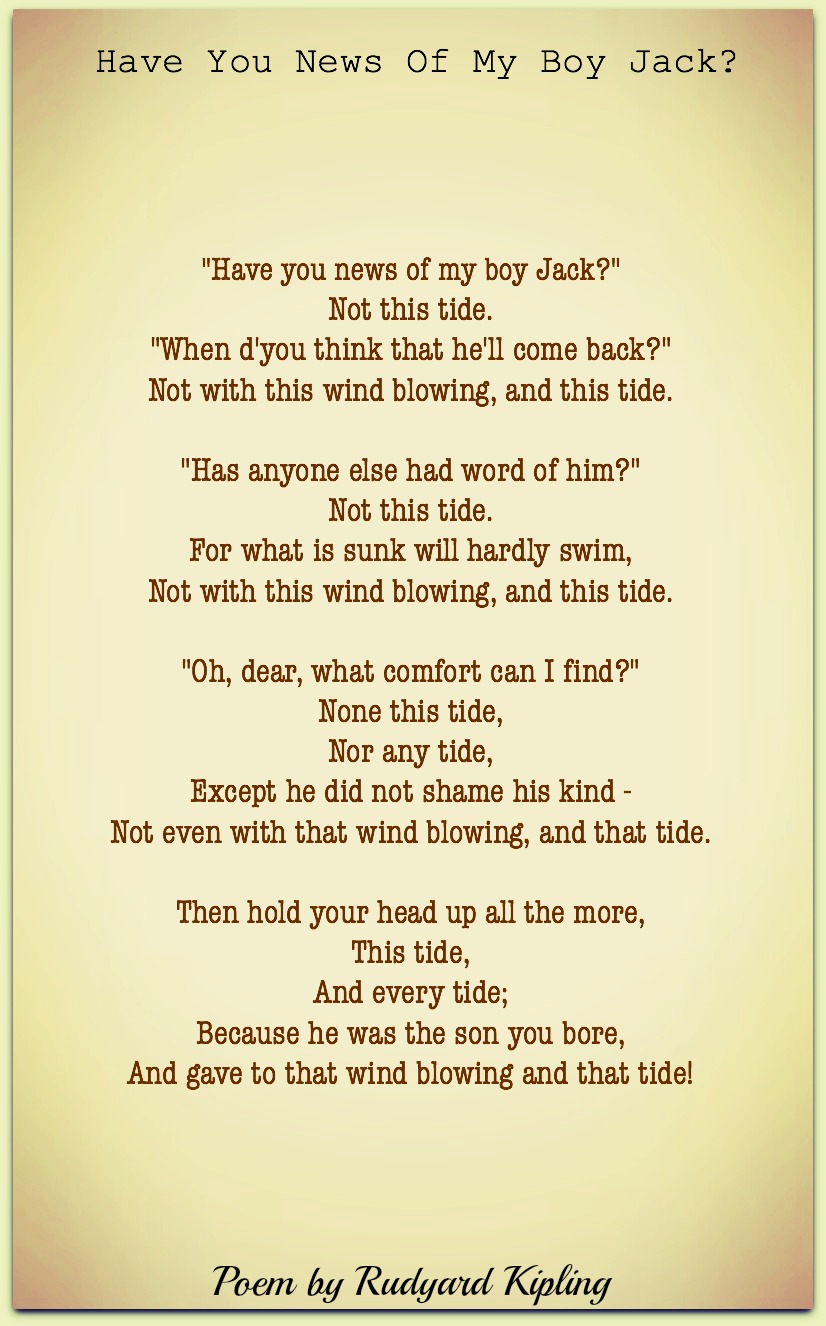
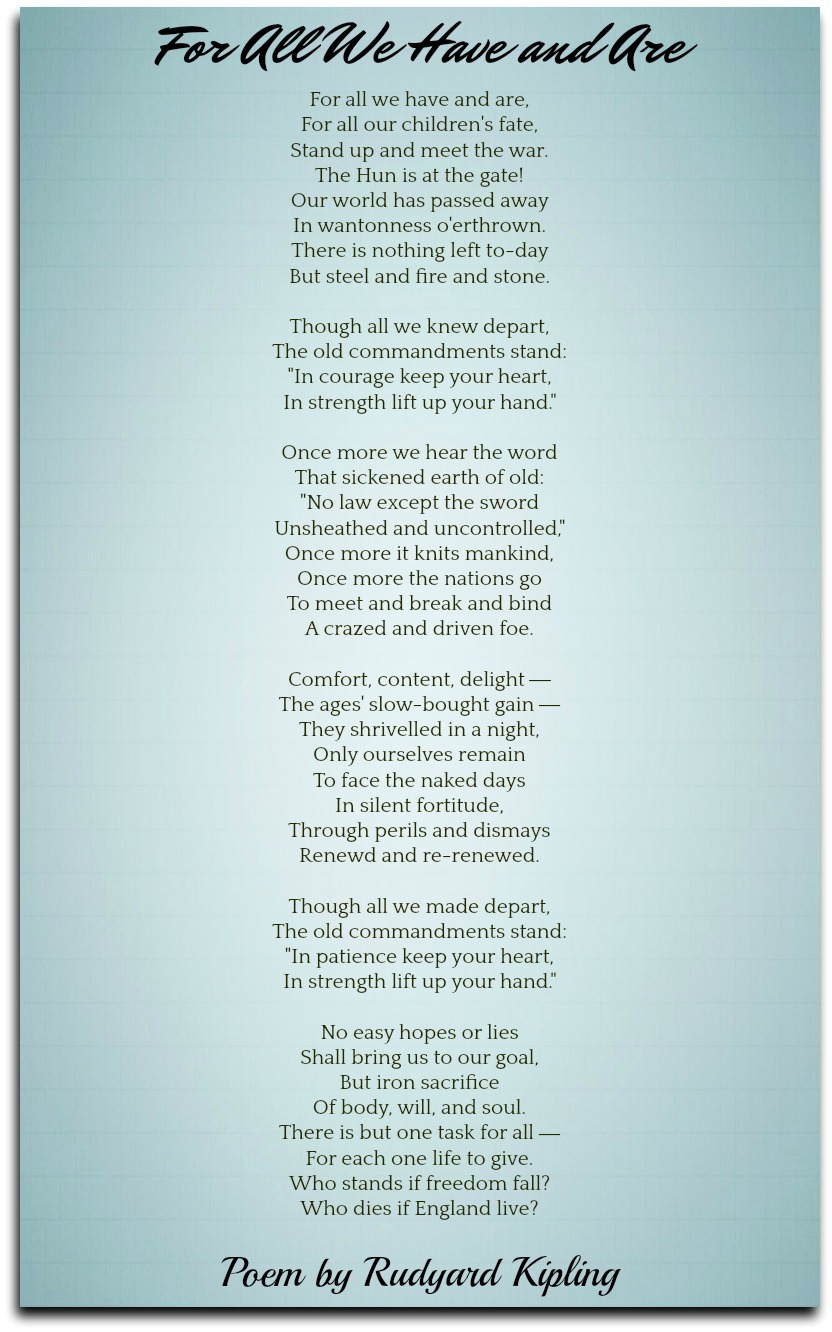
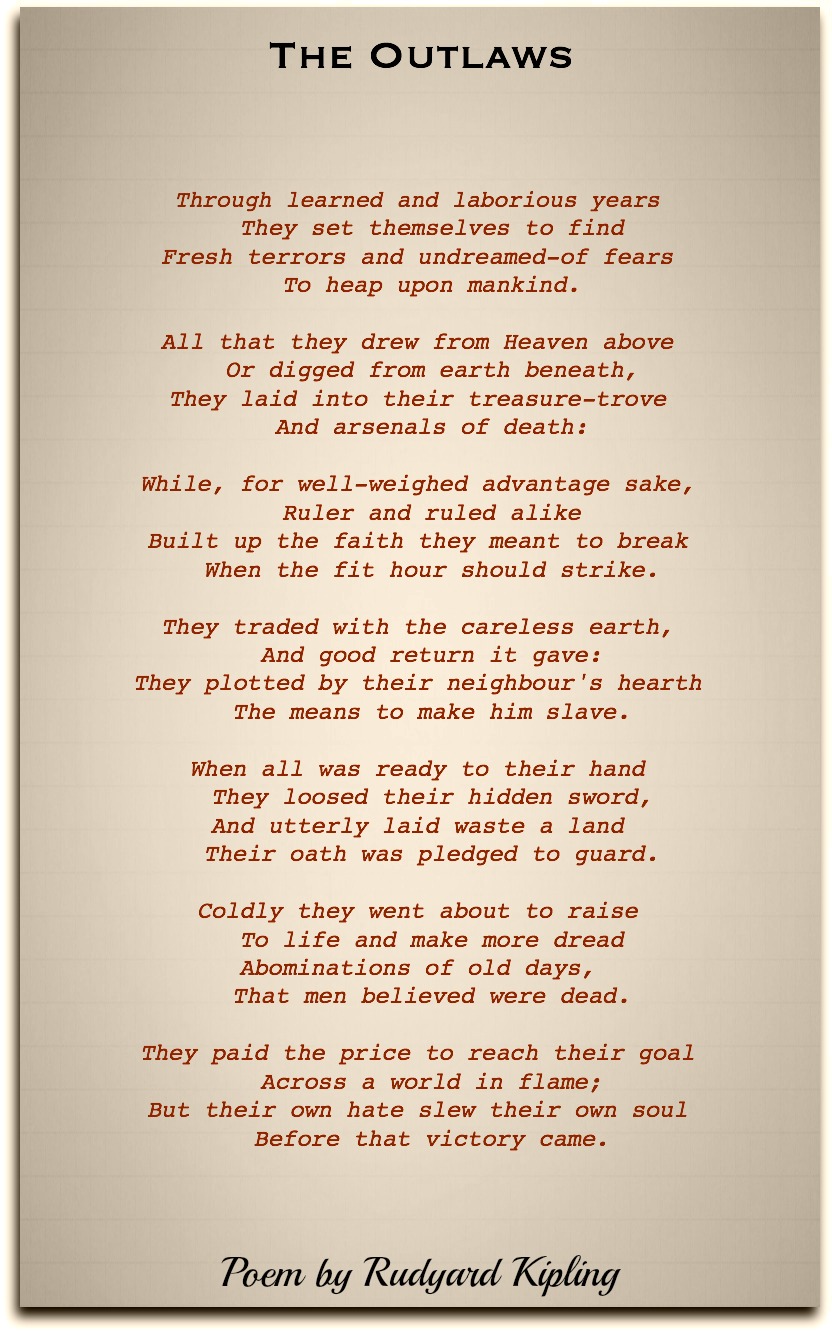
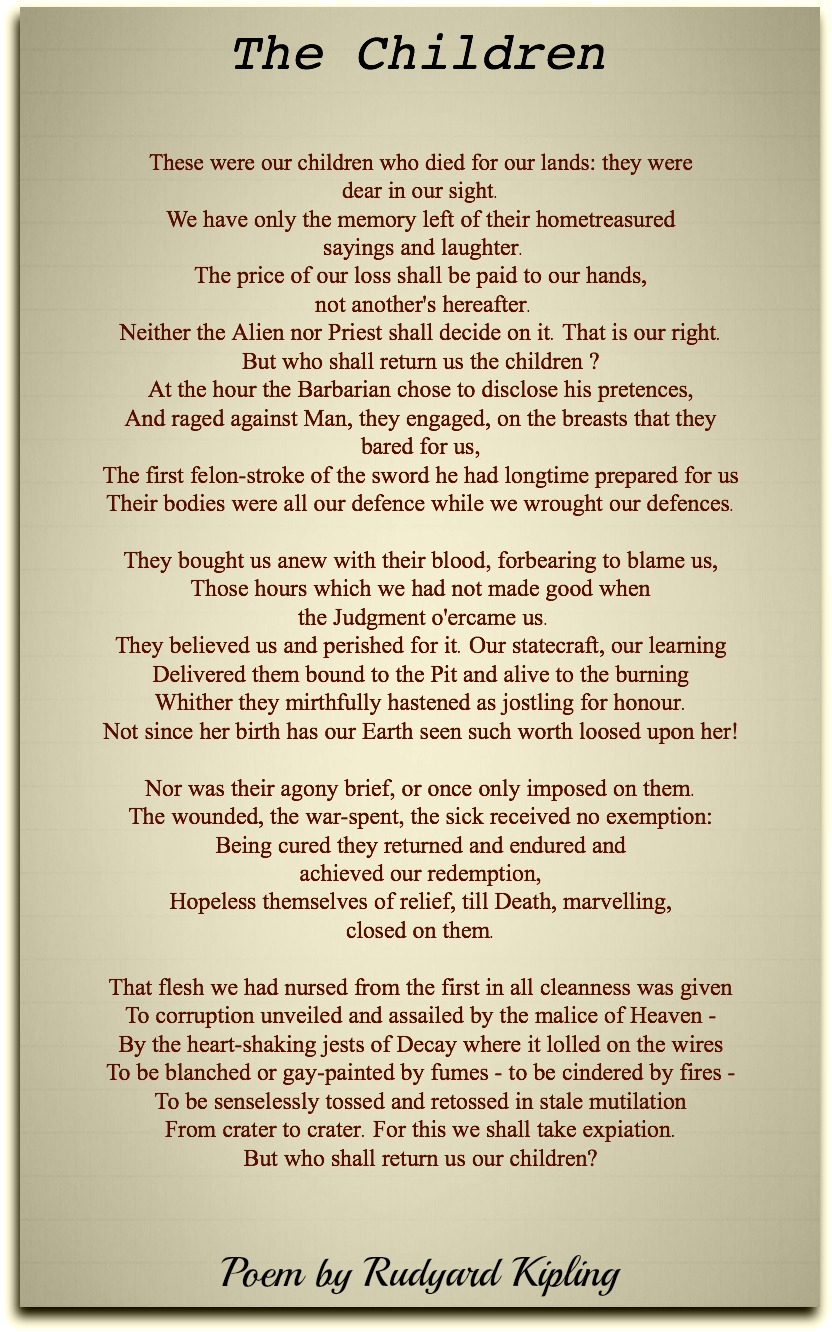
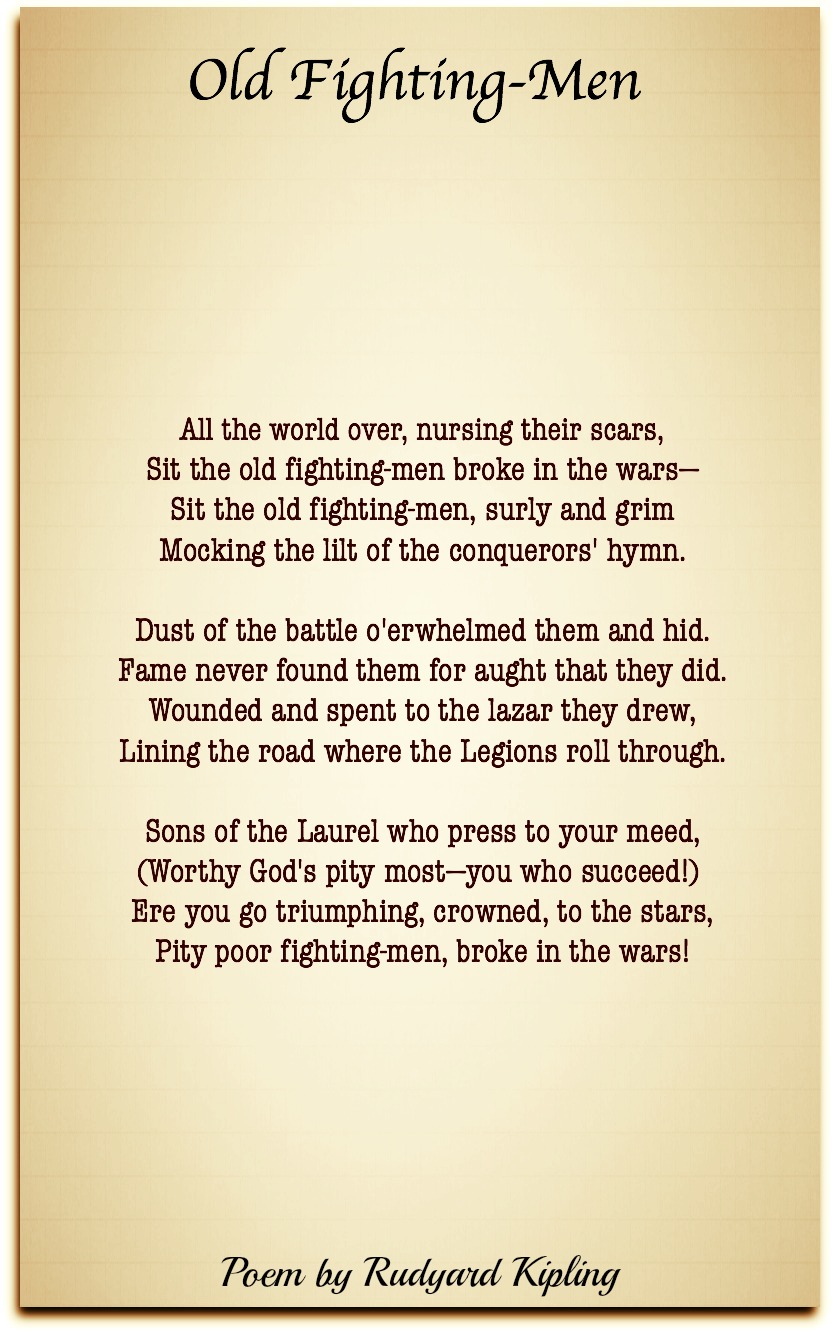
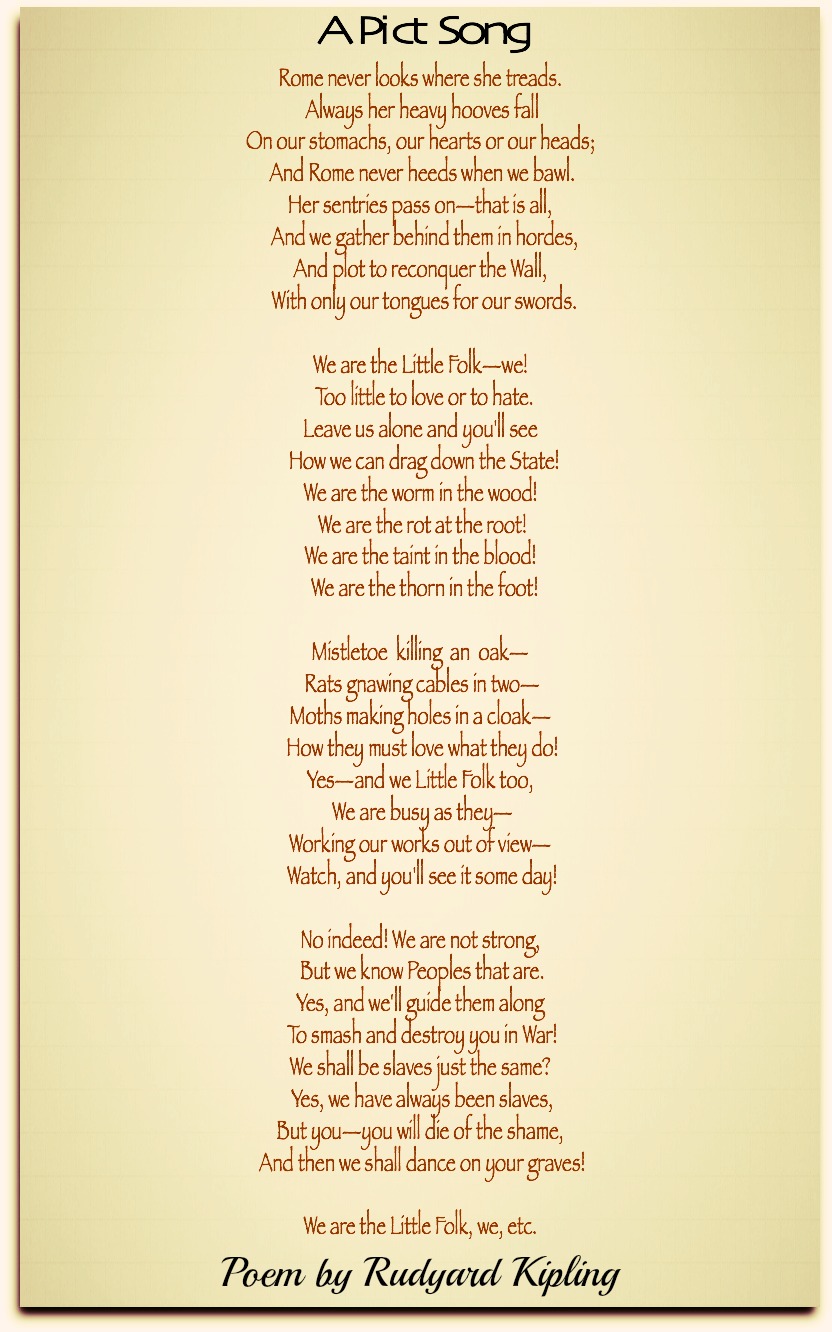
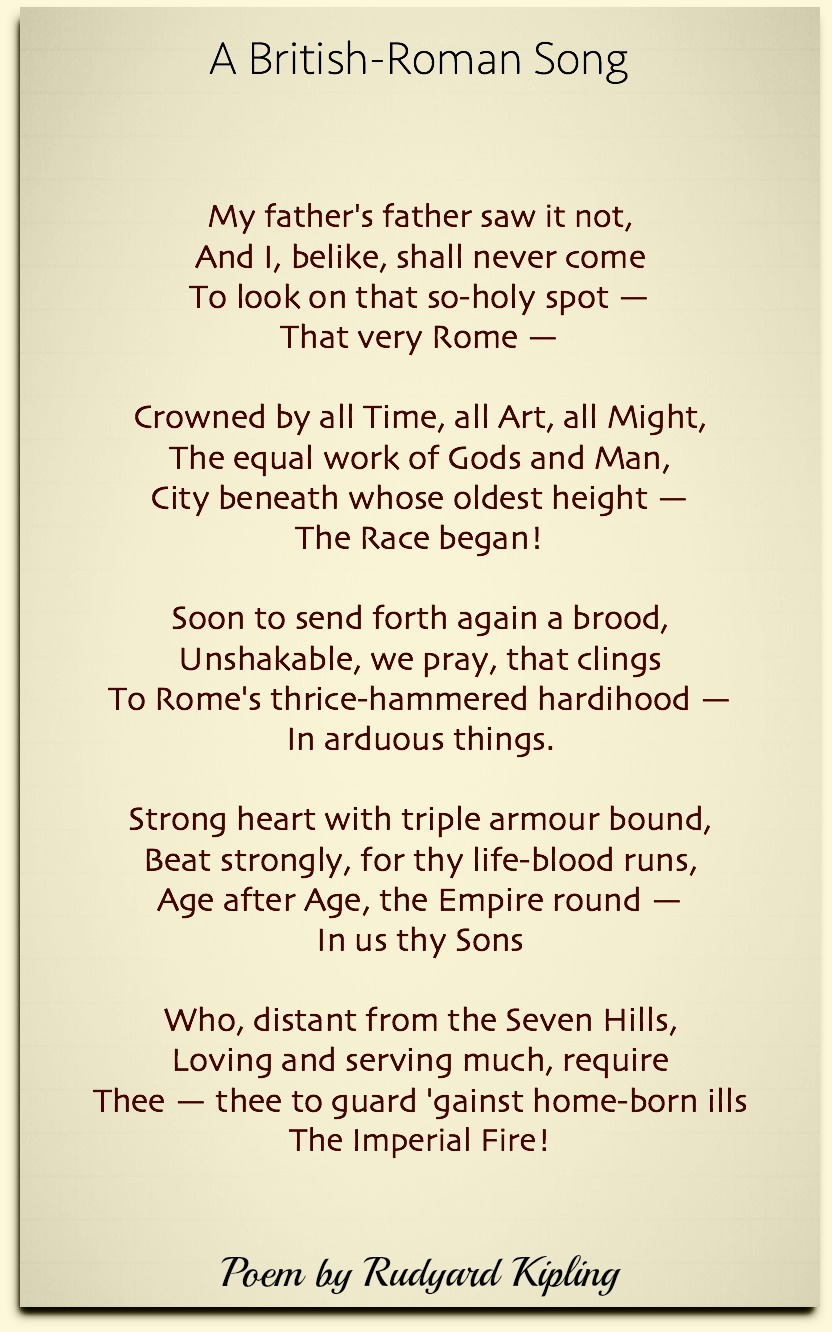
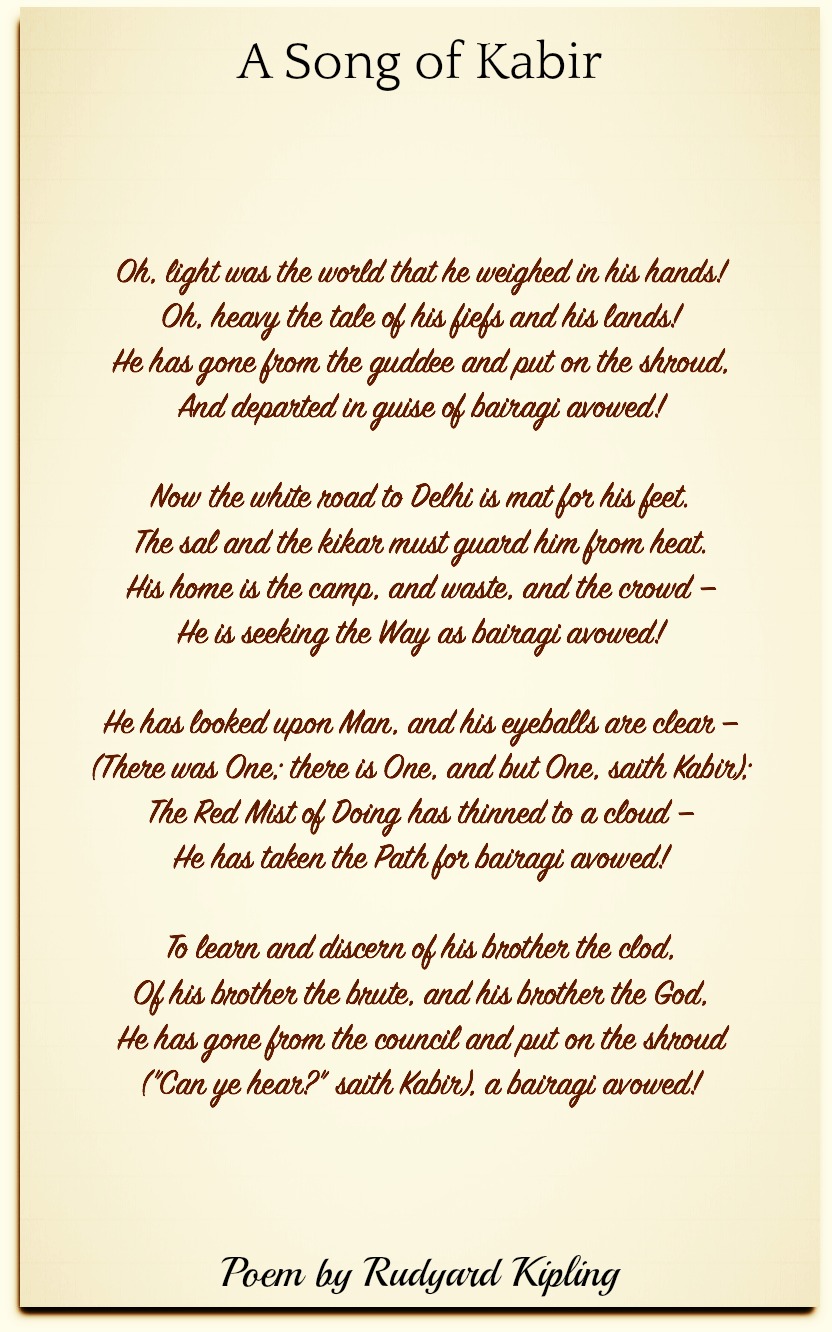
Song of the Red War-Boat
Shove off from the wharf-edge! Steady!
Watch for a smooth! Give way!
If she feels the lop already
She'll stand on her head in the bay.
It's ebb-it's dusk-it's blowing
The shoals are a mile of white,
But (snatch her along!) we're going
To find our master to-night.
For we hold that in all disaster
Of shipwreck, storm, or sword,
A Man must stand by his Master
When once he has pledged his word.
Raging seas have we rowed in
But we seldom saw them thus,
Our master is angry with
Odin-Odin is angry with us!
Heavy odds have we taken,
But never before such odds.
The Gods know they are forsaken
We must risk the wrath of the Gods!
Over the crest she flies from,
Into its hollow she drops,
Cringes and clears her eyes from
The wind-torn breaker-tops,
Ere out on the shrieking shoulder
Of a hill-high surge she drives.
Meet her! Meet her and hold her!
Pull for your scoundrel lives!
The thunders bellow and clamour
The harm that they meant to do!
There goes Thor's own Hammer
Cracking the dark in two!
Close! But the blow has missed her,
Here comes the wind of the blow!
Row or the squall'll twist her
Broadside on to it!-Row!
Heark'ee, Thor of the Thunder!
We are not here for a jest
For wager, warfare, or p]under,
Or to put your power to test.
This work is none of our wishing-
We would house at home if we might
But our master is wrecked out fishing.
We go to find him to-night.
For we hold that in all disaster
As the Gods Themselves have said
A Man must stand by his Master
Till one of the two is dead.
That is our way of thinking,
Now you can do as you will,
While we try to save her from sinking
And hold her head to it still,
Bale her and keep her moving,
Or she'll break her back in the trough
Who said the weather's improving,
Or the swells are taking off ?
Sodden, and chafed and aching,
Gone in the loins and knees
No matter-the day is breaking,
And there's far less weight to the seas!
Up mast, and finish baling
In oars, and out with the mead
The rest will he two-reef sailing.
That was a night indeed!
But we hold that in all disaster
(And faith. we have found it true.
If only you stand by your Master,
The Gods will stand by you!
|
The Voortrekker
The gull shall whistle in his wake, the blind wave break in fire,
He shall fulfill God's utmost will unknowing His desire;
And he shall see old planets pass and alien stars arise,
And give the gale his seaworn sail in shadow of new skies.
Strong lust of gear shall drive him forth and hunger arm his hand
To win his food from the desert rude, his foothold from the sand.
His neighbors' smoke shall vex his eyes, their voices break his rest,
He shall go forth till South is North, sullen and dispossessed.
He shall desire loneliness, and his desire shall bring
Hard on his heels a thousand wheels, a People, and a King;
He shall come back in his own track, and by his scarce cooled camp;
There shall he meet the roaring street, the derrick, and the stamp;
There he shall blaze a nation's ways with hatchet and with brand,
Till on his last-won wilderness an Empire's outposts stand!
|
The Appeal
If I have given you delight
By aught that I have done,
Let me lie quiet in that night
Which shall be yours anon:
And for the little, little, span
The dead are born in mind,
Seek not to question other than
The books I leave behind.
|
Song of the Galley Slaves
We pulled for you when the wind was against us and the sails
were low.
Will you never let us go?
We ate bread and onions when you took towns, or ran aboard
quickly when you were beaten back by the foe.
The Captains walked up and down the deck in fair weather sing-
ing songs, but we were below.
We fainted with our chins on the oars and you did not see that
we were idle, for we still swung to and fro.
Will you never let us go?
The solt made the oar-hands like shark-skin; our knees were
cut to the bone with salt-cracks; our hair was stuck to
our foreheads; and our lips were cut to the gums, and you
whipped us because we could not row.
Will you never let us go?
But, in a little time, we shall run out of the port-holes as the water
runs along the oar-blade, and though you tell the others
to row after us you will never catch us till you catch the
oar-thresh and tie up the winds in the belly of the sail.
Aho!
Will you never let us go?
|
The Undertaker's Horse
The eldest son bestrides him,
And the pretty daughter rides him,
And I meet him oft o' mornings on the Course;
And there kindles in my bosom
An emotion chill and gruesome
As I canter past the Undertaker's Horse.
Neither shies he nor is restive,
But a hideously suggestive
Trot, professional and placid, he affects;
And the cadence of his hoof-beats
To my mind this grim reproof beats: —
"Mend your pace, my friend, I'm coming. Who's the next?"
Ah! stud-bred of ill-omen,
I have watched the strongest go — men
Of pith and might and muscle — at your heels,
Down the plantain-bordered highway,
(Heaven send it ne'er be my way!)
In a lacquered box and jetty upon wheels.
Answer, sombre beast and dreary,
Where is Brown, the young, the cheery,
Smith, the pride of all his friends and half the Force?
You were at that last dread dak
We must cover at a walk,
Bring them back to me, O Undertaker's Horse!
With your mane unhogged and flowing,
And your curious way of going,
And that businesslike black crimping of your tail,
E'en with Beauty on your back, Sir,
Pacing as a lady's hack, Sir,
What wonder when I meet you I turn pale?
It may be you wait your time, Beast,
Till I write my last bad rhyme, Beast —
Quit the sunlight, cut the rhyming, drop the glass —
Follow after with the others,
Where some dusky heathen smothers
Us with marigolds in lieu of English grass.
Or, perchance, in years to follow,
I shall watch your plump sides hollow,
See Carnifex (gone lame) become a corse —
See old age at last o'erpower you,
And the Station Pack devour you,
I shall chuckle then, O Undertaker's Horse!
But to insult, jibe, and quest, I've
Still the hideously suggestive
Trot that hammers out the unrelenting text,
And I hear it hard behind me
In what place soe'er I find me: —
"'Sure to catch you sooner or later. Who's the next?"
|
The King and the Sea
After His Realms and States were moved
To bare their hearts to the King they loved,
Tendering themselves in homage and devotion,
The Tide Wave up the Channel spoke
To all those eager, exultant folk:-
"Hear now what Man was given you by the Ocean!
"There was no thought of Orb or Crown
When the single wooden chest went down
To the steering-flat, and the careless Gunroom haled him
To learn by ancient and bitter use,
How neither Favour nor Excuse,
Nor aught save his sheer self henceforth availed him.
"There was no talk of birth or rank
By the slung hammock or scrubbed plank
In the steel-grated prisons where 1 cast him;
But ****rd hours and a narrow space
For rest-and the naked light on his face-
While the ship's traffic flowed, unceasing, past him.
"Thus I schooled him to go and come-
To speak at the word-at a sign be dumb;
To stand to his task, not seeking others to aid him;
To share in honour what praise might fall
For the task accomplished, and-over all-
To swallow rebuke in silence. Thus I made him.
"I loosened every mood of the deep
On him, a child and sick for sleep,
Through the long watches that no time can measure,
When I drove him, deafened and choked and blind,
At the wave-tops cut and spun by the wind;
Lashing him, face and eyes, with my displeasure.
"I opened him all the guile of the seas-
Their sullen, swift-sprung treacheries,
To be fought, or forestalled, or dared, or dismissed with laughter.
I showed him Worth by Folly concealed,
And the flaw in the soul that a chance revealed
(Lessons remembered-to bear fruit thereafter).
"I dealt him Power beneath his hand,
For trial and proof, with his first Command-
Himself alone, and no man to gainsay him.
On him the End, the Means, and the Word,
And the harsher judgment if he erred,
And-outboard-Ocean waiting to betray him.
"Wherefore, when he came to be crowned,
Strength in Duty held him bound,
So that not Power misled nor ease ensnared him
Who had spared himself no more than his seas had spared him!"
After His Lieges, in all His Lands,
Had laid their hands between His hands,
And His ships thundered service and devotion,
The Tide Wave, ranging the Planet, spoke
On all Our foreshores as it broke:-
"Know now what Man 1 gave you-I, the Ocean!"
|
The Storm Cone
This is the midnight-let no star
Delude us-dawn is very far.
This is the tempest long foretold-
Slow to make head but sure to hold
Stand by! The lull 'twixt blast and blast
Signals the storm is near, not past;
And worse than present jeopardy
May our forlorn to-morrow be.
If we have cleared the expectant reef,
Let no man look for his relief.
Only the darkness hides the shape
Of further peril to escape.
It is decreed that we abide
The weight of gale against the tide
And those huge waves the outer main
Sends in to set us back again.
They fall and whelm. We strain to hear
The pulses of her labouring gear,
Till the deep throb beneath us proves,
After each shudder and check, she moves!
She moves, with all save purpose lost,
To make her offing from the coast;
But, till she fetches open sea,
Let no man deem that he is free!
|
Memories
THOUGH all the Dead were all forgot
And razed were every tomb,
The Worm-the Worm that dieth not
Compels Us to our doom.
Though all which once was England stands
Subservient to Our will,
The Dead of whom we washed Our hands,
They have observance still.
We laid no finger to Their load.
We multiplied Their woes.
We used Their dearly-opened road
To traffic with Their foes:
And yet to Them men turn their eyes,
To Them are vows renewed
Of Faith, Obedience, Sacrifice,
Honour and Fortitude!
Which things must perish. But Our hour
Comes not by staves or swords
So much as, subtly, through the power
Of small corroding words.
No need to make the plot more plain
By any open thrust;
But-see Their memory is slain
Long ere Their bones are dust!
Wisely, but yearly, filch some wreath-
Lay some proud rite aside-
And daily tarnish with Our breath
The ends for which They died.
Distract, deride, decry, confuse-
(Or-if it serves Us-pray!)
So presently We break the use
And meaning of Their day!
|
The English Way
After the fight at Otterburn,
Before the ravens came,
The Witch-wife rode across the fern
And spoke Earl Percy's name.
"Stand up-stand up, Northumberland!
I bid you answer true,
If England's King has under his hand
A Captain as good as you?"
Then up and spake the dead Percy-
Oh, but his wound was sore!
"Five hundred Captains as good," said he,
"And I trow five hundred more.
"But I pray you by the lifting skies,
And the young wind over the grass,
That you take your eyes from off my eyes,
And let my spirit pass."
"Stand up-stand up, Northumberland!
I charge you answer true,
If ever you dealt in steel and brand,
How went the fray with you?"
"Hither and yon," the Percy said;
"As every fight must go;
For some they fought and some they fled,
And some struck ne'er a blow.
"But I pray you by the breaking skies,
And the first call from the nest,
That you turn your eyes away from my eyes,
And let me to my rest."
"Stand up-stand up, Northumberland!
I will that you answer true,
If you and your men were quick again,
How would it be with you?"
"Oh, we would speak of hawk and hound,
And the red deer where they rove,
And the merry foxes the country round,
And the maidens that we love.
"We would not speak of steel or steed,
Except to grudge the cost;
And he that had done the doughtiest deed
Would mock himself the most.
"But I pray you by my keep and tower,
And the tables in my hall,
And I pray you by my lady's bower
(Ah, bitterest of all!)
"That you lift your eyes from outen my eyes,
Your hand from off my breast,
And cover my face from the red sun-rise,
And loose me to my rest!"
She has taken her eyes from out of his eyes-
Her palm from off his breast,
And covered his face from the red sun-rise,
And loosed him to his rest.
"Sleep you, or wake, Northumberland-
You shall not speak again,
And the word you have said 'twixt quick and dead
I lay on Englishmen.
"So long as Severn runs to West
Or Humber to the East,
That they who bore themselves the best
Shall count themselves the least.
"While there is fighting at the ford,
Or flood along the Tweed,
That they shall choose the lesser word
To cloke the greater deed.
"After the quarry and the kill-
The fair fight and the fame-
With an ill face and an ill grace
Shall they rehearse the same.
"Greater the deed, greater the need
Lightly to laugh it away,
Shall be the mark of the English breed
Until the Judgment Day!"
|
London Stone
WHEN you come to London Town,
(Grieving-grieving!)
Bring your flowers and lay them down
At the place of grieving.
When you come to London Town,
(Grieving-grieving!)
Bow your head and mourn your own,
With the others grieving.
For those minutes, let it wake
(Grieving-grieving!)
All the empty-heart and ache
That is not cured by grieving.
For those minutes, tell no lie:
(Grieving-grieving!)
"Grave, this is thy victory;
And the sting of death is grieving."
Where's our help, from earth or heaven,
(Grieving-grieving!)
To comfort us for what we've given,
And only gained the grieving.
Heaven's too far and earth too near,
(Grieving-grieving!)
But our neighbour's standing here,
Grieving as we're grieving.
What's his burden every day?
(Grieving-grieving!)
Nothing man can count or weigh,
But loss and love's own grieving.
What is the tie betwixt us two
(Grieving-grieving!)
That must last our whole lives through?
"As I suffer, so do you."
That may ease the grieving.
|
For All We Have and Are
For all we have and are,
For all our children's fate,
Stand up and meet the war.
The Hun is at the gate!
Our world has passed away
In wantonness o'erthrown.
There is nothing left to-day
But steel and fire and stone.
Though all we knew depart,
The old commandments stand:
"In courage keep your heart,
In strength lift up your hand."
Once more we hear the word
That sickened earth of old:
"No law except the sword
Unsheathed and uncontrolled,"
Once more it knits mankind,
Once more the nations go
To meet and break and bind
A crazed and driven foe.
Comfort, content, delight —
The ages' slow-bought gain —
They shrivelled in a night,
Only ourselves remain
To face the naked days
In silent fortitude,
Through perils and dismays
Renewd and re-renewed.
Though all we made depart,
The old commandments stand:
"In patience keep your heart,
In strength lift up your hand."
No easy hopes or lies
Shall bring us to our goal,
But iron sacrifice
Of body, will, and soul.
There is but one task for all —
For each one life to give.
Who stands if freedom fall?
Who dies if England live?
|
The Choice (The American Spirit Speaks)
To the Judge of Right and Wrong
With Whom fulfillment lies
Our purpose and our power belong,
Our faith and sacrifice.
Let Freedom's land rejoice!
Our ancient bonds are riven;
Once more to us the eternal choice
Of good or ill is given.
Not at a little cost,
Hardly by prayer or tears,
Shall we recover the road we lost
In the drugged and doubting years,
But after the fires and the wrath,
But after searching and pain,
His Mercy opens us a path
To live with ourselves again.
In the Gates of Death rejoice!
We see and hold the good—
Bear witness, Earth, we have made our choice
For Freedom's brotherhood.
Then praise the Lord Most High
Whose Strength hath saved us whole,
Who bade us choose that the Flesh should die
And not the living Soul!
|
A Recantation
What boots it on the Gods to call?
Since, answered or unheard,
We perish with the Gods and all
Things made—except the Word.
Ere certain Fate had touched a heart
By fifty years made cold,
I judged thee, Lyde, and thy art
O'erblown and over-bold.
But he—but he, of whom bereft
I suffer vacant days—
He on his shield not meanly left
He cherished all thy lays.
Witness the magic coffer stocked
With convoluted runes
Wherein thy very voice was locked
And linked to circling tunes.
Witness thy portrait, smoke-defiled,
That decked his shelter-place.
Life seemed more present, wrote the child,
Beneath thy well-known face.
And when the grudging days restored
Him for a breath to home,
He, with fresh crowds of youth, adored
Thee making mirth in Rome.
Therefore, I humble, join the hosts,
Loyal and loud, who bow
To thee as Queen of Song—and ghosts,
For I remember how
Never more rampant rose the Hall
At thy audacious line
Than when the news came in from Gaul
Thy son had—followed mine.
But thou didst hide it in thy breast
And, capering, took the brunt
Of blaze and blare, and launched the jest
That swept next week the front.
Singer to children! Ours possessed
Sleep before noon—but thee,
Wakeful each midnight for the rest,
No holocaust shall free!
Yet they who use the Word assigned,
To hearten and make whole,
Not less than Gods have served mankind,
Though vultures rend their soul.
|
The Verdicts [Jutland]
Not in the thick of the fight,
Not in the press of the odds,
Do the heroes come to their height,
Or we know the demi-gods.
That stands over till peace.
We can only perceive
Men returned from the seas,
Very grateful for leave.
They grant us sudden days
Snatched from their business of war;
But we are too close to appraise
What manner of men they are.
And, whether their names go down
With age-kept victories,
Or whether they battle and drown
Unreckoned, is hid from our eyes.
They are too near to be great,
But our children shall understand
When and how our fate
Was changed, and by whose hand.
Our children shall measure their worth.
We are content to be blind . . .
But we know that we walk on a new-born earth
With the saviours of mankind.
|
The Ubique
There is a word you often see, pronounce it as you may -
'You bike,' 'you bikwe,' 'ubbikwe' - alludin' to R.A.
It serves 'Orse, Field, an' Garrison as motto for a crest,
An' when you've found out all it means I'll tell you 'alf the rest.
Ubique means the long-range Krupp be'ind the low-range 'ill -
Ubique means you'll pick it up an', while you do stand, still.
Ubique means you've caught the flash an' timed it by the sound.
Ubique means five gunners' 'ash before you've loosed a round.
Ubique means Blue Fuse1, an' make the
'ole to sink the trail. 1extreme range
Ubique means stand up an' take the Mauser's 'alf-mile 'ail.
Ubique means the crazy team not God nor man can 'old.
Ubique means that 'orse's scream which turns your innards cold.
Ubique means 'Bank, 'Olborn, Bank - a penny all the way -
The soothin' jingle-bump-an'-clank from day to peaceful day.
Ubique means 'They've caught De Wet, an' now we sha'n't be long.'
Ubique means 'I much regret, the beggar's going strong!'
Ubique means the tearin' drift where, breech-blocks jammed with mud,
The khaki muzzles duck an' lift across the khaki flood.
Ubique means the dancing plain that changes rocks to Boers.
Ubique means the mirage again an' shellin' all outdoors.
Ubique means 'Entrain at once for Grootdefeatfontein'!
Ubique means 'Off-load your guns' - at midnight in the rain!
Ubique means 'More mounted men. Return all guns to store.'
Ubique means the R.A.M.R. Infantillery Corps!
Ubique means the warnin' grunt the perished linesman knows,
When o'er 'is strung an' sufferin' front the shrapnel sprays 'is foes,
An' as their firin' dies away the 'usky whisper runs
From lips that 'aven't drunk all day: 'The Guns! Thank Gawd, the Guns!'
Extreme, depressed, point-blank or short, end-first or any'ow,
From Colesberg Kop to Quagga's Poort - from Ninety-Nine till now -
|
The Question
Brethren, how shall it fare with me
When the war is laid aside,
If it be proven that I am he
For whom a world has died?
If it be proven that all my good,
And the greater good I will make,
Were purchased me by a multitude
Who suffered for my sake?
That I was delivered by mere mankind
Vowed to one sacrifice,
And not, as I hold them, battle-blind,
But dying with open eyes?
That they did not ask me to draw the sword
When they stood to endure their lot —
That they only looked to me for a word,
And I answered I knew them not?
If it be found, when the battle clears,
Their death has set me free,
Then how shall I live with myself through the years
Which they have bought for me?
Brethren, how must it fare with me,
Or how am I justified,
If it be proven that I am he
For whom mankind has died —
If it be proven that I am he
Who, being questioned, denied?
|
Gehazi
Whence comest thou, Gehazi,
So reverend to behold,
In scarlet and in ermines
And chain of England's gold?"
"From following after Naaman
To tell him all is well,
Whereby my zeal hath made me
A Judge in Israel."
Well done; well done, Gehazi!
Stretch forth thy ready hand,
Thou barely 'scaped from judgment,
Take oath to judge the land
Unswayed by gift of money
Or privy bribe, more base,
Of knowledge which is profit
In any market-place.
Search out and probe, Gehazi,
As thou of all carist try,
The truthful, well-weighed answer
That tells the blacker lie —
The loud, uneasy virtue
The anger feigned at will,
To overbear a witness
And make the Court keep still.
Take order now, Gehazi,
That no man talk aside
In secret with his judges
The while his case is tried.
Lest he should show them — reason
To keep a matter hid,
And subtly lead the questions
Away from what he did.
Thou mirror of uprightness,
What ails thee at thy vows?
What means the risen whiteness
Of the skin between thy brows?
The boils that shine and burrow,
The sores that slough and bleed —
The leprosy of Naaman
On thee and all thy seed?
Stand up, stand up, Gehazi,
Draw close thy robe and go,
Gehazi, Judge in Israel,
A leper white as snow!
|
A Nativity
The Babe was laid in the Manger
Between the gentle kine —
All safe from cold and danger —
"But it was not so with mine,
(With mine! With mine!)
"Is it well with the child, is it well?"
The waiting mother prayed.
"For I know not how he fell,
And I know not where he is laid."
A Star stood forth in Heaven;
The Watchers ran to see
The Sign of the Promise given —
"But there comes no sign to me.
(To me! To me!)
"My child died in the dark.
Is it well with the child, is it well?
There was none to tend him or mark,
And I know not how he fell."
The Cross was raised on high;
The Mother grieved beside —
"But the Mother saw Him die
And took Him when He died.
(He died! He died!)
"Seemly and undefiled
His burial-place was made —
Is it well, is it well with the child?
For I know not where he is laid."
On the dawning of Easter Day
Comes Mary Magdalene;
But the Stone was rolled away,
And the Body was not within —
(Within! Within!)
"Ah, who will answer my word?
The broken mother prayed.
"They have taken away my Lord,
And I know not where He is laid."
"The Star stands forth in Heaven.
The watchers watch in vain
For Sign of the Promise given
Of peace on Earth again —
(Again! Again!)
"But I know for Whom he fell" —
The steadfast mother smiled,
"Is it well with the child — is it well?
It is well — it is well with the child!"
|
Rimmon
Duly with knees that feign to quake—
Bent head and shaded brow,—
Yet once again, for my father's sake,
In Rimmon's House I bow.
The curtains part, the trumpet blares,
And the eunuchs howl aloud;
And the gilt, swag-bellied idol glares
Insolent over the crowd.
"This is Rimmon, Lord of the Earth—
"Fear Him and bow the knee!"
And I watch my comrades hide their mirth
That rode to the wars with me.
For we remember the sun and the sand
And the rocks whereon we trod,
Ere we came to a scorched and a scornful land
That did not know our God;
As we remember the sacrifice,
Dead men an hundred laid—
Slain while they served His mysteries,
And that He would not aid—
Not though we gashed ourselves and wept,
For the high-priest bade us wait;
Saying He went on a journey or slept,
Or was drunk or had taken a mate.
(Praise ye Rimmon, King of Kings,
Who ruleth Earth and Sky!
And again I bow as the censer swings
And the God Enthroned goes by.)
Ay, we remember His sacred ark
And the virtuous men that knelt
To the dark and the hush behind the dark
Wherein we dreamed He dwelt;
Until we entered to hale Him out
And found no more than an old
Uncleanly image girded about
The loins with scarlet and gold.
Him we o'erset with the butts of our spears—
Him and his vast designs—
To be scorn of our muleteers
And the jest of our halted line.
By the picket-pins that the dogs defile,
In the dung and the dust He lay,
Till the priests ran and chattered awhile
And we wiped Him and took Him away.
Hushing the matter before it was known,
They returned to our fathers afar,
And hastily set Him afresh on His throne
Because he had won us the war.
Wherefore with knees that feign to quake—
Bent head and shaded brow—
To this dog, for my father's sake,
In the Rimmon's House I bow!
|
The Broken Men
For things we never mention,
For Art misunderstood —
For excellent intention
That did not turn to good;
From ancient tales' renewing,
From clouds we would not clear —
Beyond the Law's pursuing
We fled, and settled here.
We took no tearful leaving,
We bade no long good-byes.
Men talked of crime and thieving,
Men wrote of fraud and lies.
To save our injured feelings
'Twas time and time to go —
Behind was dock and Dartmoor,
Ahead lay Callao!
The widow and the orphan
That pray for ten per cent,
They clapped their trailers on us
To spy the road we went.
They watched the foreign sailings
(They scan the shipping still),
And that's your Christian people
Returning good for ill!
God bless the thoughtful islands
Where never warrants come;
God bless the just Republics
That give a man a home,
That ask no foolish questions,
But set him on his feet;
And save his wife and daughters
From the workhouse and the street!
On church and square and market
The noonday silence falls;
You'll hear the drowsy mutter
Of the fountain in our halls.
Asleep amid the yuccas
The city takes her ease —
Till twilight brings the land-wind
To the clicking jalousies.
Day long the diamond weather,
The high, unaltered blue —
The smell of goats and incense
And the mule-bells tinkling through.
Day long the warder ocean
That keeps us from our kin,
And once a month our levee
When the English mail comes in.
You'll find us up and waiting
To treat you at the bar;
You'll find us less exclusive
Than the average English are.
We'll meet you with a carriage,
Too glad to show you round,
But — we do not lunch on steamers,
For they are English ground.
We sail o' nights to England
And join our smiling Boards —
Our wives go in with Viscounts
And our daughters dance with Lords,
But behind our princely doings,
And behind each coup we make,
We feel there's Something Waiting,
And — we meet It when we wake.
Ah, God! One sniff of England —
To greet our flesh and blood —
To hear the traffic slurring
Once more through London mud!
Our towns of wasted honour —
Our streets of lost delight!
How stands the old Lord Warden?
Are Dover's cliffs still white?
|
|
